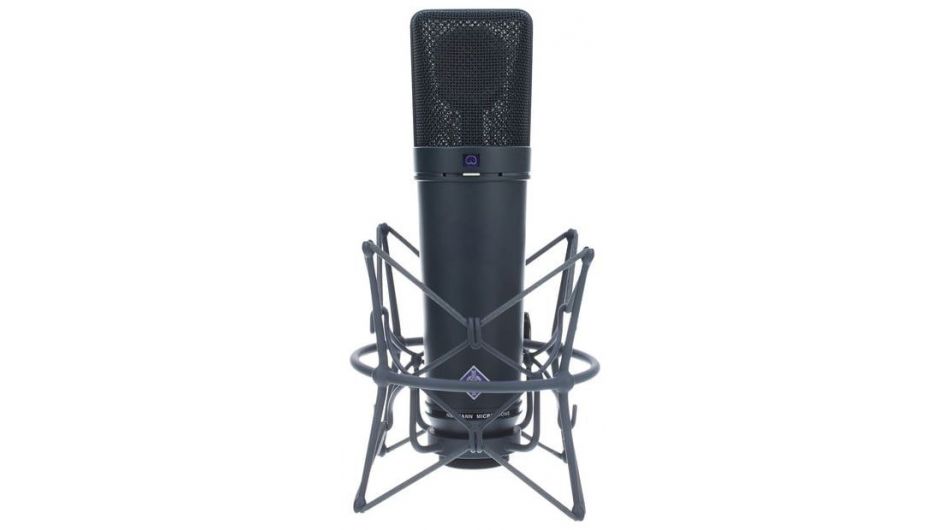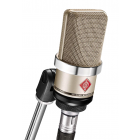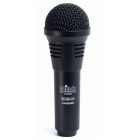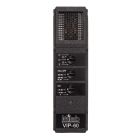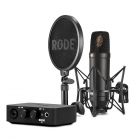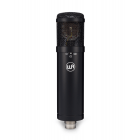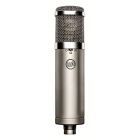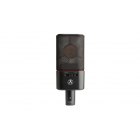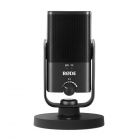The industry standard U87
The Neumann U 87 Ai is the modern incarnation of a classic microphone. Introduced in 1967, the U 87 immediately gained popularity with engineers, producers and their customers; by the mid-1970s, it was a staple of any world-class recording studio. And it still is. Walk into any session and you'll see 87's everywhere. On piano, vocals, toms, overheads, guitar cabs, brass, strings, congas - you name it. Its popularity is easy to understand: it ushered in a new era of fidelity and reliability, and with three selectable polar patterns (cardioid, omnidirectional and figure-8), plus a switchable highpass filter and 10dB pre-attenuation pad, the microphone is incredibly versatile, and an ideal choice for a wide range of recording techniques. The Neumann U 87 Ai is the standard large diaphragm condenser microphone. Read on to find out what it can do for you.Read more
A great choice for almost any source
When you're aiming for fidelity, clarity and authoritative presence, the U 87 Ai - with its flat midrange and gentle presence boost - is your go-to microphone. We all need vocals to shine in the mix, and the 87 was born to do just that. It's not perfect for every vocalist, but you'll find it to be the vocal microphone of choice on countless iconic recordings. Piano? Grand or upright, when you need an acoustic piano to sit nicely in a thick track, a pair of 87s will get the job done.Switchable polar patterns
With a choice of three switchable polar patterns (omnidirectional, cardioid and figure-8), the U 87 Ai gives you impressive flexibility when exploring different recording techniques. With two 87s, you can employ stereo techniques such as spaced pair (A/B), X-Y (including Blumlein), ORTF array and mid-side (M-S). For a full orchestra, you can add a third 87 for the minimalist - and highly effective - Mercury Living Presence technique: three spaced omni 87s across the orchestral soundstage, centered above the conductor's podium.Updated with modern circuitry
Neumann produced the original U 87 from 1967 to 1986, when it was replaced by the current version, the U 87 Ai. The U 87 Ai has improved electronic components; however, the capsule design remains unchanged. The modern circuitry increases the operational headroom of the microphone by reducing the resistance through which the capsule bias voltage is supplied. This gives a 10dB higher sensitivity for identical sound pressure levels and improves the signal-to-noise ratio by 3dB.Filter and attenuation
When using the U 87 Ai to capture a loud source, the microphone's switchable 10dB pre-damping pad comes in handy. When the pad is activated, the microphone accepts sound pressure levels up to 127dB - perfect for recording toms or a dimmed guitar amp.An additional switch engages the microphone's low-frequency cutoff, which reduces unwanted mud and rumble at the microphone amp's input. This setting also compensates for the proximity effect, the bass boost that all pressure gradient transducers exhibit when very close to a source.
Neumann microphones are not assembly line products
In 1928, Georg Neumann founded the company that bears his name and introduced the first mass-produced condenser microphone, the CMV 3, also known as the Neumann Bottle. Since then, the Neumann badge has stood for unwavering quality. Neumann's instantly recognizable diamond is more than a company logo - it is a seal of quality. Every microphone that wears it bears witness to this proud tradition. This level of excellence requires rigorous quality control to maintain Neumann's status as a leading manufacturer of studio microphones. Neumanns are not assembly line products; they are handmade in Germany by highly trained technicians.U-87Ai mt Studio Set Specifications
- Neumann U-87Ai
- large-diaphragm condenser microphone
- acoustic working principle: pressure gradient transducer
- directional pattern: omnidirectional, cardioid, figure-8
- frequency range: 20 Hz - 20 kHz
- sensitivity at 1 kHz to 1 kOhm: 20/28/22 mV/Pa
- nominal impedance: 200 ohms
- measured input impedance: 1 kOhm
- equivalent noise level: 26/23/25 dB
- signal-to-noise ratio: 68/71/69 dB
- max. SPL for THD 0.5%: 117 dB (cardioid)
- maximum output power: 390 mV
- dynamic range of the mic. amplifier: 105 dB
- power supply voltage: 48 V ± 4 V
- power consumption: 0.8 mA
- matching connector: XLR3F
- color: black
- weight: 500 gr
- diameter: 56 mm
- length: 200 mm


